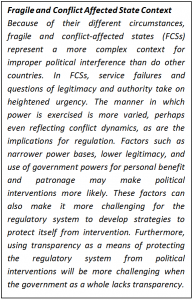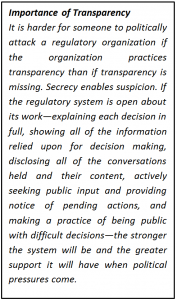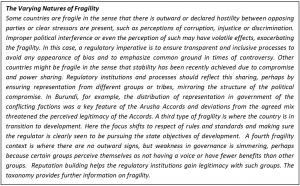Addressing Improper Political Interference – How can persons performing regulatory functions or developing regulatory instruments protect their work from improper political interference while, at the same time, maintaining accountability to the political wishes of the population?
 (Prepared by Mark Jamison and Araceli Castaneda)
(Prepared by Mark Jamison and Araceli Castaneda)
It is important at the outset to recognize that political involvement in regulation may be either proper or improper. Proper political involvement includes engagements that provide regulators with important information regarding the impacts of regulatory decisions, hold regulators accountable for their decisions under the law, provide politicians with information that they may use for making policy decisions and informing constituents, and follow accepted procedures with sufficient transparency to ensure that the public is confident that regulation is legitimately implementing established laws and policies without stakeholder bias. The focus of this question is improper political interference, which is interference that violates procedures, seeks to bias regulatory decision making, or seeks regulatory decisions that violate the letter or spirit of laws and policies that regulation is designed to implement.[1]
Many studies confirm the relationship between regulatory independence and infrastructure investment, namely that greater independence encourages greater investment.[2] The essence of independence is providing as much as practical a stable regulatory environment, protected over the long term from political pressures that would exploit infrastructure investment for short-term political gains, so that investors can make efficient investment decisions. In terms of institutional design, it is important to provide a stable budget for regulatory functions. This is particularly difficult in a fragile state context as government budgets are sometimes small and are often focused on urgent priorities, such as security. The Narrative provides options, such as self-regulation, that may require fewer resources.
No mechanisms are fail-safe for stopping improper political interference. Instances can be identified where those who govern do so largely through coercion, which makes proper governance nearly impossible and improper interference highly likely. Furthermore, proper governance generally relies on a system of checks and balances, which in turn depends upon a mutual agreement in which each body of the governing institutions submits itself to the authority of the others. If this agreement does not exist such that one of the bodies puts itself above the others, then political interference in regulation is likely.
Motivations for Interference
Exploitation of infrastructure can be valuable for politicians seeking to benefit their constituents, which provides the politicians with an incentive to improperly interfere in regulation. This leads to an inherent friction between political processes and effective utility service provisioning. Political processes compel successful politicians to emphasize short-term gains. In contrast effective infrastructure provisioning requires long-term planning. This long-term nature of planning makes infrastructure particularly vulnerable to political opportunism. Infrastructure services affect almost everyone—that is, everyone uses water, power, communications, and transportation in some form, and aspires to receive service from a high-quality service provider at a low price.
 The ability to direct investment and determine what customers will pay for services allows political actors to demonstrate direct benefit to constituents. For example, one politician in discussing the potential formation of a regulatory agency for his island nation said he would support such an institution only if there was a guarantee that the prices his constituents paid for electricity went down. Sometimes even a credible, yet ultimately broken, promise of service can garner political support if the lack of follow through can be blamed on others. This is often the case, because the complex linkages in network industries require coordination at several stages of production. For example, for the East Africa Power Pool to be efficient operators of transmission, generation and distribution networks must build adequate capacity and manage the power loads. Infrastructure is vulnerable to political opportunism because an efficient system requires sunk investments, the number of service providers in an efficient system is generally small relative to the number of other important stakeholders, and the project may involve foreign investors.
The ability to direct investment and determine what customers will pay for services allows political actors to demonstrate direct benefit to constituents. For example, one politician in discussing the potential formation of a regulatory agency for his island nation said he would support such an institution only if there was a guarantee that the prices his constituents paid for electricity went down. Sometimes even a credible, yet ultimately broken, promise of service can garner political support if the lack of follow through can be blamed on others. This is often the case, because the complex linkages in network industries require coordination at several stages of production. For example, for the East Africa Power Pool to be efficient operators of transmission, generation and distribution networks must build adequate capacity and manage the power loads. Infrastructure is vulnerable to political opportunism because an efficient system requires sunk investments, the number of service providers in an efficient system is generally small relative to the number of other important stakeholders, and the project may involve foreign investors.
Improper political interference may also take the form of forcing the service provider to incur costs uneconomically. For example, governments in some countries force utilities to hire more workers than they need, perhaps to provide patronage or perhaps in the belief that this creates jobs. Political pressure may also drive the utility to make investments in particular communities or other areas ahead of when the investments should be made based on sound business practices. The result is lower efficiency and perhaps diminished credibility.
Political power seeking is accentuated in some country contexts. One of the root causes of conflicts for power and keeping it in some countries is that power is a means of having and maintaining certain benefits and privileges, for the politician personally, for his or her family, and sometimes for the politician’s clan. Furthermore in some countries politics is a primary means for gaining wealth, at least quick and easy wealth. This can be compounded if the tenure of political or government positions is short and the positions are hard to obtain. Such conditions exaggerate the incentives for interference, especially in infrastructure because of the magnitude of the money involved. This can lead to corruption.
Strategies for Addressing Improper Political Interference
Subject to the caveats mentioned above, strategies that those involved in establishing or reforming regulation include:
- Investing in relationships with allies (such as people in academia or those influencing public opinion);
- Anticipating when political pressures might occur;
- Identifying the stakeholder and political losses that are driving the interference and taking steps to diminish those losses;
- Developing a well-respected, professional organization;
- Providing politicians with things they value most, short of compromising the integrity of the regulatory system;
- Building strong organizations; and
- Being transparent.
In addition those providing infrastructure services can serve as a good and effective corporate citizen, including supporting community organizations, engaging in works that build communities, and adhering to high ethical standards.
The remainder expands on these strategies.
Effectively addressing improper political interference requires dealing with both the external environment—that is, the pressures coming from outside the regulatory institutions—and the internal environment—that is, the organizational strengths and integrity necessary to withstand political pressures.
Four steps can be taken to addressing the external environment: (1) Distinguishing between accountability and interference; (2) Understanding the world of the politician; (3) Adopting interventions that provide an alternative value to the political actor; and (4) Understanding why political interference can be valuable to a politician. Number four is explained above, but the remainder are described next.
- Distinguish between Accountability and Interference: In contrast to interference, accountability consists of the communication and incentive mechanisms that the government uses to ensure that those performing regulatory functions are doing so according to the law to the best of their abilities. The laws provide the proper guidance[3] and the oversight provides the accountability.[4]
Maintaining proper accountability involves activities shared by regulators and their political overseers. The first shared activity is the delegation of authority. Authority to regulators should be spelled out in statutes or other legal instruments, such as contracts, that are difficult to change and difficult to ignore because they can be enforced by others, such as an independent judiciary. The authority delegated to the regulatory agency should include establishing prices, service standards, incentives, and market rules; enforcing decisions; determining whether regulations are meeting policy goals; and adjusting rules, procedures, and decisions as needed. The political body holds the regulator accountable by reviewing outcomes and comparing them to policy priorities, considering why it does or why a service does not perform as desired, defining and refining the vision for the utility services, and adapting policies to evolving circumstances while recognizing needs for long-term investments.
This accountability is the second shared activity as it is shared between the regulator and the political overseers through communication mechanisms that provide policy makers with information on outcomes, factors that affect outcomes, and an ongoing dialogue on how the system can be improved. The political oversight becomes interference when politicians seek to impose pressures regarding prices, standards, and the like that are outside the procedures, and standards established in law or other authorizing legal instruments.
- Investigate and Understand the Political Context: Effectively diminishing political interference begins with a foundation of understanding the world of the politician and why infrastructure services are particularly valuable to politicians. The world of the politician is unique in at least four ways. First, the system is essentially flat—that is, little hierarchy and sanctioning come from the outside. In a typical organization, someone high up in the organization defines its purpose, organizes the institution, and sanctions people’s work. This authority figure is ultimately responsible for hiring, firing, and incentivizing employees. In most systems politicians are supported and sanctioned by constituents, coalitions, and particular interest groups, including rebel groups in some instances. Some politicians may be more powerful than others, but the amount of formal authority within the hierarchy is limited.
When political work is sanctioned by constituents, politicians and political bodies are incentivized to maintain power by focusing on visible actions, distributing benefits to powerful stakeholders, and providing rhetoric that maintains a critical mass of public support and allies. In effect, the definition of a successful politician is the one who maintains power, generally by winning the next election, but perhaps by avoiding a coup d’état in less democratic contexts. Because a significant drop in such backing can result in a fairly quick loss of political power and position, politicians are under pressure to focus on maintaining support, often through short-term gains. Such actions sometimes result in the reduction of very substantial long-term gains. In the case of infrastructure, where investments can have lives of 30 to 50 years, politicians tend to focus on the up-front costs rather than the long-term benefits.
The second difference is that expressions of personal ambition are frowned upon in most organizations, but not so in the political arena where personal ambition is expected and often rewarded.
Thirdly, in most organizations conflicts are not made personal unless they really are personal. In politics, conflicts are often stated in personal terms, but effective politicians understand that the conflicts are not really personal. Personal conflicts weaken a politician’s ability to perform because they create dependable “no” votes on issues that the politician champions.
Finally, in politics one finds an inherent conflict between work and loyalty. The work of the politician is to build political coalitions that advance the politician’s causes. However, this often requires developing working relationships with opposition politicians. As constituents observe these relationships, they feel betrayed because they elected the politician to fight against the policies of the opposition. The successful politician must carefully balance his or her identity with constituents with the practical realities of building coalitions on issues.
- Affect the Value of Political Interference: Given the inherent political value and vulnerability of infrastructure, what are some strategies that can diminish political pressures? One strategy is to establish the proper external relationships. Every politician maintains a system of relationships that allows him or her to stay in power and advance policies. Mapping those relationships for the most critical politicians allows leaders in regulation to understand what each politician values most and which relationships are most likely to motivate political interference. With that information, the regulatory leaders can then identify ways to deliver political value that does not lead to interference, diminish the value of interference, and see the buildup of political pressures before interference happens so as to be prepared when the inevitable occurs.
Possible tactics include giving politicians credit for good news, alerting them in advance to possible bad news, providing valuable information on regulatory issues and on non-regulatory issues that are important to the politicians, identifying regulatory benefits that are particularly valuable to their constituents, and identifying the losses that key relationships experience because of regulation and taking steps to diminish those losses.
Knowledge of the political landscape is also important for addressing the environment inside regulatory organizations. The primary objective in addressing the inside environment is to ensure that the organization is successful in achieving its work, in communicating that success, and in providing the public, the media, and important stakeholders with the confidence that there is nothing hidden in the regulatory work. Important management practices for achieving this objective include the following: (1) Ensuring that everyone in executive positions knows the regulatory mission and priorities, and expresses them on a regular basis inside and outside the organizations; (2) Openly discussing external political realities within the organization so that employees are confident that their work is relevant to the external environment; (3) Establishing and publishing work plans and tracking progress; and (4) Maintaining transparency and effectively communicating it through the press so that if or when accusations arise, the information needed to address the accusations is already publicly available and known.
References
Ehrhardt, David, Eric Groom, Jonathan Halpern, and Seini O’Connor. 2007. “Economic Regulation of Urban Water Supply and Sanitation Services: Some Practical Lessons.” Water Unit Discussion Paper No. 9. World Bank, Washington, DC.
Jamison, Mark A. 2007. “Leadership and the Independent Regulator.” GITAM Journal of Management 5 (1): 1–16.
Jamison, Mark A., and Araceli Castaneda. 2011. “Reset for Regulation and Utilities: Leadership for a Time of Constant Change.” Electricity Journal 24 (4): 86–93.
Jamison, Mark A., and Araceli Castaneda. 2014. “Execution and Leadership: Fulfilling Conflicting Responsibilities in Utility Regulation.” Electricity Journal 27 (3): 67–76.
Jamison, Mark A., Robert Rowe, and Brett A. Perlman. 2005. “Getting on the Balcony: Leadership Challenges in Regulation.” Electricity Journal 18 (10): 43–52.
Martin, Eric R. 2011. “Economic and Environmental Sustainability through Adaptive Leadership.” PURC Working Paper. University of Florida, Department of Economics.
[1] As countries seek to engage private sector in public service delivery, the role of government needs to shift from provider/implementer to regulator. This shift motivates improper political interference because the shift causes political actors to lose valued roles and influence.
[2] See, for example, Luis Andres, Jose Luis Guasch, and Sebastian Lopez Azumendi, “Regulatory Governance and Sector Performance for Electricity Distribution in Latin America,” World Bank Policy Research Working Paper, 2009; John Cubbin and Jon Stern, “The Impact of Regulatory Governance and Privatization on Electricity Industry Generation Capacity in Developing Economies.” World Bank Economic Review 20, no. 1 (2006): 115–41; Antonio Estache, Ana Goicoechea, and Lourdes Trujillo, “Utilities Reforms and Corruption in Developing Countries,” Utilities Policy 17, no. 2 (2009): 191–202; and Luis H. Gutierrez, “The Effect of Endogenous Regulation on Telecommunications Expansion and Efficiency in Latin America,” Journal of Regulatory Economics 23, no. 3 (2003): 257–86.
[3] Accountability is not limited to oversight by policies and laws. Citizens and stakeholder groups also hold regulators accountable. Political voice is more challenging in a fragile state context than in other situations. Where the country is in transition, electoral processes often come much later as a transition government is established before elections. Thus early electoral processes are highly imperfect and values will not be expressed.through elections, but through the compromises that form and function in the transitional government. For additional discussion, see the FAQ on stakeholders <HYPERLINK>.
[4] For more discussion on accountability mechanisms, see Jamison, Mark A., and Araceli Castaneda. 2014. “Execution and Leadership: Fulfilling Conflicting Responsibilities in Utility Regulation.” Electricity Journal 27 (3): 67–76; and Castaneda, Araceli, Mark A. Jamison, and Michelle Phillips. 2014. “Considerations for the Design and Transformation of Regulatory Systems” University of Florida, Department of Economics, PURC Working Paper.

